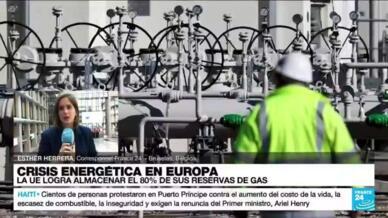First modification:
Russian giant Gazprom halted the flow of natural gas through the Nord Stream pipeline on Wednesday, a stoppage it announced in advance that will last three days. Germany, whose dependence on Russian hydrocarbons is one of the largest in the European Union, gave a piece of calm about the supply.
In a new challenge to Europe, Russia again stopped this Wednesday, August 31, the supply of gas through the Nord Stream supply route, raising the prospects of recession and energy rationing in some countries on the continent.
Although, according to the Kremlin, the maintenance will last three days, European governments fear that Moscow could extend the blackout in retaliation for Western sanctions imposed after it invaded Ukraine.
The West blames Vladimir Putin for using energy supplies as a “weapon of war” while Moscow has cited technical reasons for supply cuts from the largest pipeline carrying gas to Germany.
#UPDATE Russian gas deliveries to Europe via the Nord Stream pipeline have been halted, its operator Entsog says.
Russian energy giant Gazprom had said it would stop deliveries for three days for maintenance work, further raising tensions on an already taut electricity market pic.twitter.com/ga8n9Dsvo8
— AFP News Agency (@AFP) August 31, 2022
The president of the German network regulator, Klaus Mueller, assured that this country could cope with the three-day interruption, as long as the flows resume on Saturday, September 3, as planned.
“I guess we’ll be able to deal with it,” Mueller told Reuters TV in an interview. “I am confident that Russia will be back to at least 20% (of capacity) from Saturday, but no one can really say.”
Europe accumulates gas reserves for winter
In a European Union that receives less and less Russian gas to power industry, heat homes and generate electricity, increasing the amount in reserve has been a key focus of its governments.

In July, the German government proposed that the gas storage be filled to 75% of its capacity by the first of September and 80% to 90%, respectively, by October and November. Today the first objective has already been met and the storage facilities in Germany are more than 83% full.
More restrictions on gas supplies in Europe would deepen an energy crisis that has already caused a 400% rise in wholesale gas prices since last August, squeezing consumers and businesses and forcing governments to spend billions to ease the crisis. burden on your pockets.
In the euro zone, inflation reached a new record in August of 9.1% year-on-year, a phenomenon caused by high electricity prices.
With EFE, Reuters and AP














Add Comment